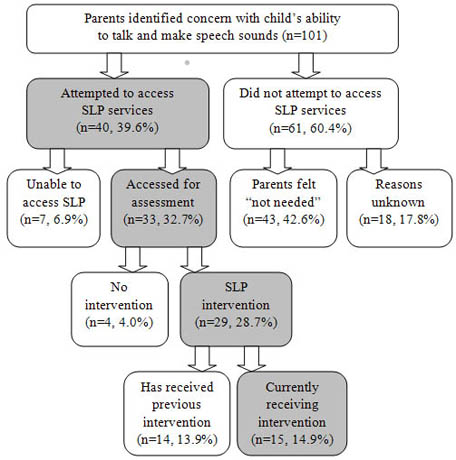During Phase 3, the parents of 109 children identified as having "difficulty talking and making speech sounds" returned questionnaires containing information about their children's speech development and their use of speech pathology services. During Phase 4, a subsample of 13 parents was interviewed to learn more about their experiences of accessing services to assist their children with speech impairment.
Findings revealed:
- Only a third of the 109 parents had previously accessed speech pathology services for assessment of their children's speech, and just 26% reported their children had received intervention.
- Most parents had not sought speech pathology services, reporting that "services were not needed." They indicated this was because they were waiting for others (teachers, GPs) to confirm their concerns that their child needed assistance with speech. Parents identified teachers, family, friends and doctors as important sources of information about their children's speech.
- These findings have implications for education and provision of information to teachers, GPs and the general public about speech development, difficulties, when and how to refer
- A small number of parents had attempted to access services but had been unsuccessful (due to waiting lists, distance to services, services not being available etc). Parents wanted to be able to access services when and where they were required.

Parents' utilisation of speech-language pathology services for their children with speech impairment
Related Publications:
McAllister, L., McCormack, J., McLeod, S., & Harrison, L. J. (2010, May). The Sound Effects Study: Access to and participation in speech pathology services for children with speech impairment. Speech Pathology Australia, Melbourne.
McAllister, L., McCormack, J., McLeod, S., & Harrison, L.J. (2010). Expectations and experiences of accessing and participating in services for childhood speech impairment. Manuscript in submission.
